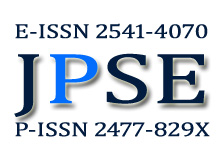Implementation of Reciprocal Teaching Strategy for reading comprehension skills of XII students
Abstract
This study explores the implementation of the Reciprocal Teaching Strategy to enhance students' reading comprehension skills in Hortatory Exposition texts. Conducted as a Classroom Action Research (CAR) over two cycles in Class XII-7 at SMA Negeri 5 Purworejo during the 2023/2024 academic year, the study involved 35 students (25 females and 10 males). Data were collected through pre-tests, post-tests, observations, and documentation, analyzed using simple descriptive quantitative methods, and presented in table and chart. The findings reveal a significant improvement in reading comprehension, with average scores increasing from 63 (Cycle I) to 81 (Cycle II). This growth highlights the effectiveness of the Reciprocal Teaching Strategy, particularly when supported by interactive instructional media such as videos. The strategy's integration of predicting, questioning, clarifying, and summarizing fosters critical thinking and active student engagement, addressing challenges in understanding both explicit and implicit textual information. These results underscore the strategy’s potential for advancing reading comprehension and its applicability in 21st-century learning contexts.
References
Ainaa, R. (2022). THE EFFECT OF RECIPROCAL TEACHING STRATEGY TOWARDS THE STUDENTS’ READING COMPREHENSION. BRIGHT VISION: Journal of Language and Education, 2(2), 287–294.
Aprilia, I., Simaibang, B., & Mulyadi. (2021). The Effect of The Application of Reciprocal Teaching Strategy (RTS) and Reading Motivation Towards The Eighth Grade Students’ Reading Ability at Junior High School 35 Palembang. Jurnal Pendidikan Tambusai, 5(2), 5162–5165. https://jptam.org/index.php/jptam/article/view/1778
Ayun, Q., & Yunus, M. (2017). the Efficacy of Reciprocal Teaching Method in Teaching Reading Comprehension To Efl Students. ELT Echo : The Journal of English Language Teaching in Foreign Language Context, 2(2), 134. https://doi.org/10.24235/eltecho.v2i2.2174
Bilad, M. R., Doyan, A., & Susilawati, S. (2022). Analyzing STEM Students’ Critical Thinking Performance: Literacy Study on the Polymer Film Fabrication Process Irradiated with Gamma Rays. International Journal of Essential Competencies in Education, 1(2), 49–60. https://doi.org/10.36312/ijece.v1i2.782
Bilad, M. R., Zubaidah, S., & Prayogi, S. (2024). Addressing the PISA 2022 Results: A Call for Reinvigorating Indonesia’s Education System. International Journal of Essential Competencies in Education, 3(1), 1–12. https://doi.org/10.36312/ijece.v3i1.1935
Bilici, Ö., & Subaşı, G. (2022). EFL learners’ metacognitive awareness of global reading strategies and L2 reading comprehension skills: The efficacy of reciprocal teaching. The Reading Matrix: An International Online Journal, 22(2), 170–185.
Dadabhoy, K., & Dadabhoy, M. (2021). Implementation of reciprocal teaching strategies: Improving reading skills and academic performance of secondary students. Review of Applied Management and Social Sciences, 4(3), 751–760.
Dew, T. P., Swanto, S., & Pang, V. (2021). the Effectiveness of Reciprocal Teaching As Reading Comprehension Intervention: a Systematic Review. Journal of Nusantara Studies (JONUS), 6(2), 156–184. https://doi.org/10.24200/jonus.vol6iss2pp156-184
Diningrat, S. W. M., Setyosari, P., Ulfa, S., & Widiati, U. (2023). The Effect of an Extended Flipped Classroom Model for Fully Online Learning and its interaction with Working Memory Capacity on Students’ Reading Comprehension. Journal of New Approaches in Educational Research, 12(1), 77–99. https://doi.org/10.7821/naer.2023.1.1073
Hamdani, B. (2020). Teaching Reading Through Reciprocal Teaching Method. Celtic: A Journal of Culture, English Language Teaching, Literature and Linguistics, 7(1), 23. https://doi.org/10.22219/celtic.v7i1.11936
Hendrisman, H., & Yanis, R. (2022). Penggunaan Model Reciprocal Teaching terhadap Keterampilan Menulis Teks Cerita Fantasi. Jurnal Kajian Bahasa, Sastra Dan Pengajaran (KIBASP), 6(1), 19–30. https://doi.org/10.31539/kibasp.v6i1.4696
Herlina, N., Hilir, R., & Pengarayaan, P. (2017). the Use of Reciprocal Strategy in Teaching Reading Comprehension. Proceedings of the Fifth International Seminar on English Language and Teaching, 105–112.
Kemmis, S., McTaggart, R., & Nixon, R. (2013). The Action Research Planner: Doing Critical Participatory Action Research. Springer Nature Singapore. https://books.google.co.id/books?id=GB3IBAAAQBAJ
Khasawneh, M. A. S., & Al-Rub, M. O. A. (2020). Development of reading comprehension skills among the students of learning disabilities. Universal Journal of Educational Research, 8(11), 5335–5341. https://doi.org/10.13189/ujer.2020.081135
Masykuri, E. S., Alekseevna, E. K., Nikitina, A. Y., Petrovna, O. A., & Purwoko, R. Y. (2024). How synchronous learning changes the workload of teachers: Experiences learned from expanding countries. Jurnal Pendidikan Surya Edukasi (JPSE), 10(2), 158-171. https://doi.org/10.37729/jpse.v10i2.5782
Mohamed, A., & Ahmed, R. (2023). Reciprocal Teaching as a Cognitive and Metacognitive Strategy in Promoting Saudi University Students’ Reading Comprehension. Open Education Studies, 5(1). https://doi.org/10.1515/edu-2022-0200
Munawaroh, S. D., Purwoko, R. Y., Kurniasih, N., & Sriyono, S. (2024). Penerapan pembelajaran berdiferensiasi Teams Assisted Individualization untuk peningkatkan kerjasama belajar siswa SMK. Jurnal Pendidikan Surya Edukasi (JPSE), 10(1), 42-49. https://doi.org/10.37729/jpse.v10i1.5153
Musdalifah, M., Firdaus, N., & Fitriani, F. (2023). Improving Students’ Reading Ability Through Reciprocal Teaching Method. JOEY: Journal of English Ibrahimy, 2(2), 48–55. https://doi.org/10.35316/joey.2023.v2i2.48-55
Oo, T. Z., Magyar, A., & Habók, A. (2021). Effectiveness of the reflection-based reciprocal teaching approach for reading comprehension achievement in upper secondary school in Myanmar. Asia Pacific Education Review, 22(4), 675–698. https://doi.org/10.1007/s12564-021-09707-8
Palinscar, A. S., & L, B. A. (1984). Reciprocal Teaching of Comprehension-Fostering and Comprehension Monitoring Activities. Cognition and Instruction, 1(2), 117–175. https://doi.org/10.1207/s1532690xci0102
Pradja, B. P., & Firmansyah, M. A. (2020). Penerapan Model Pembelajaran Reciprocal Teaching dalam Pembelajaran Matematika untuk Meningkatkan Aktivitas dan Hasil Belajar Siswa. Imajiner: Jurnal Matematika Dan Pendidikan Matematika, 2(2), 159–166. https://doi.org/10.26877/imajiner.v2i2.5829
Purba, D. F., Napitupulu, S., & Hutauruk, B. S. (2023). The Effect of Word Wall Media on The Students Reading Comprehension at Eighth Grade of SMP Negeri 9 Pematangsiantar. Jurnal Pendidikan Tambusai , 7(2018), 28353–28360.
Rahayu, K. G. A., Ardana, I. M., & Suarni, N. K. (2024). Improving Students’ Reading Comprehension Ability and Learning Activeness Using Project-Based Learning Model Assisted by Visual Media. Jurnal Pedagogi Dan Pembelajaran, 7(1), 146–154.
Rawengwan, W., & Yawiloeng, R. (2020). Reciprocal teaching method for enhancing Thai EFL learners reading comprehension ability. Sripatum Review of Humanities and Social Sciences, 20(1), 105–123. https://so05.tci-thaijo.org/index.php/spurhs/article/view/235680
Saiola, A., Dania, R., & Suparmi, S. (2023). The Effect of Using Reciprocal Teaching Strategy on Students Reading Comprehension at Tenth Grade Mechanical Engineering SMK N 1 Sumatera Barat. Argopuro: Jurnal Multidisiplin Ilmu Bahasa, 1(4), 1–14. https://ejournal.warunayama.org/index.php/argopuro/article/view/1107
Satriani, Munawir, A., Khair, U., & Putriani, N. (2022). The Impact of Using A Reciprocal Teaching Strategy on Reading Comprehension By Prospective Teachers. ETDC: Indonesian Journal of Research and Educational Review, 1(2), 169–175. https://doi.org/10.51574/ijrer.v1i2.334
Smith, O. L., & Robinson, R. (2020). Teacher Perceptions and Implementation of a Content-Area Literacy Professional Development Program. Journal of Educational Research and Practice, 10(1), 55–69. https://doi.org/10.5590/jerap.2020.10.1.04
Sulistio, A., & Haryanti, N. (2022). MODEL PEMBELAJARAN KOOPERATIF (COOPERATIVE LEARNING MODEL). In EUREKA MEDIA AKSARA (1st ed.). EUREKA MEDIA AKSARA.
Woolley, G. (2011). Reading Comprehension BT - Reading Comprehension: Assisting Children with Learning Difficulties (G. Woolley (ed.); pp. 15–34). Springer Netherlands. https://doi.org/10.1007/978-94-007-1174-7_2
Zulfah, N. (2023). Pemanfaatan Media Game Edukasi Wordwall untuk Meningkatkan Minat Belajar Siswa. Pubmedia Jurnal Penelitian Tindakan Kelas Indonesia, 1(1), 11. https://doi.org/10.47134/ptk.v1i1.5









